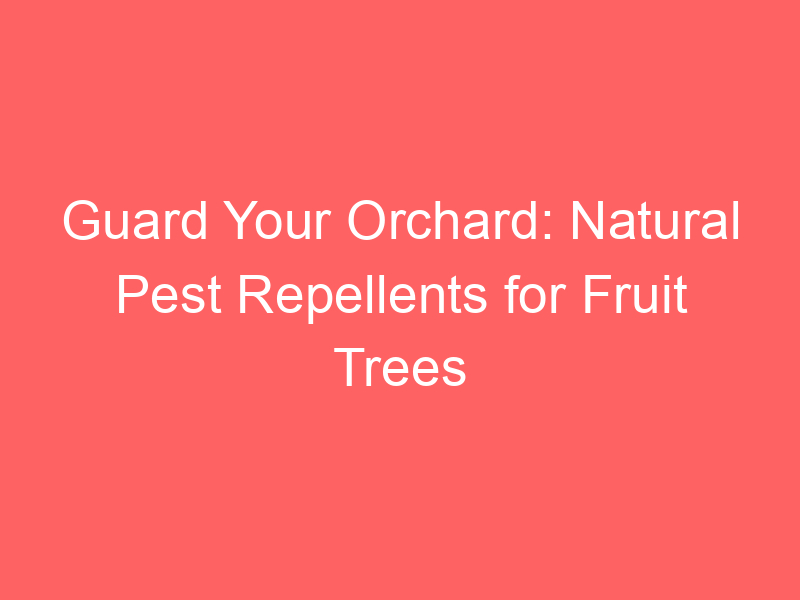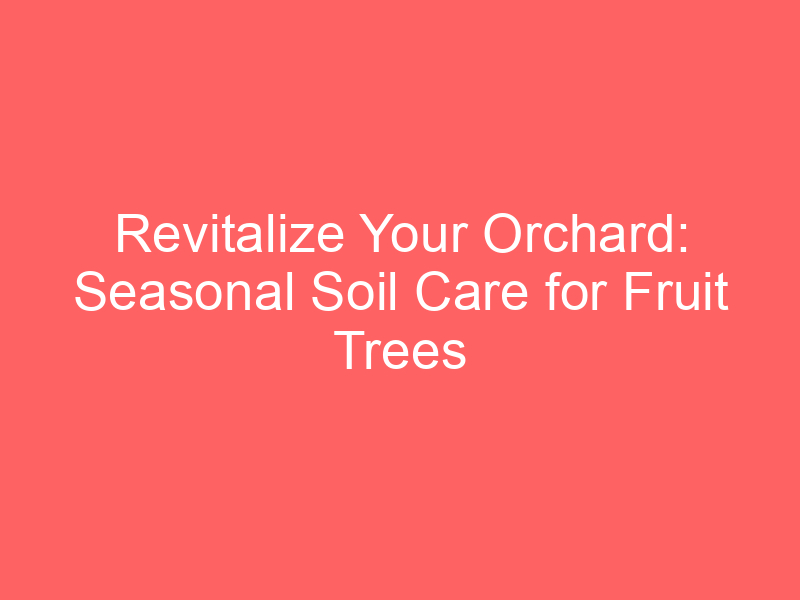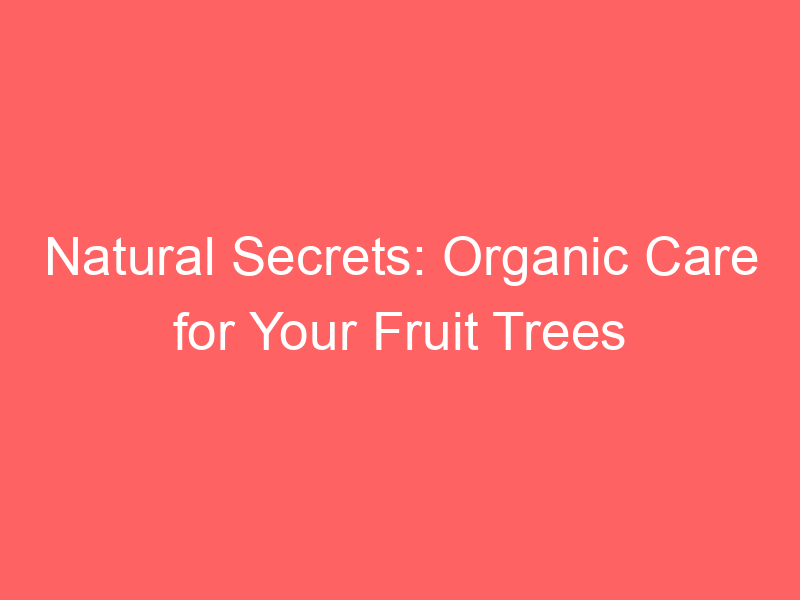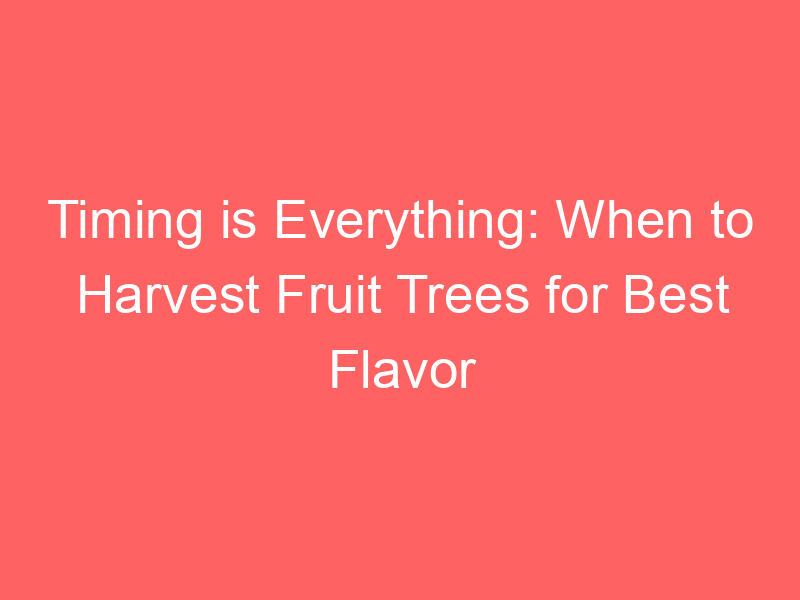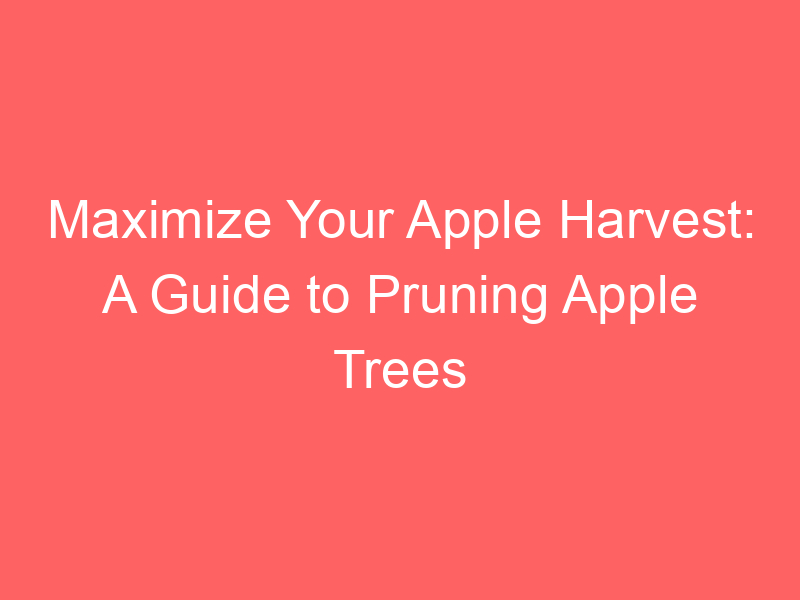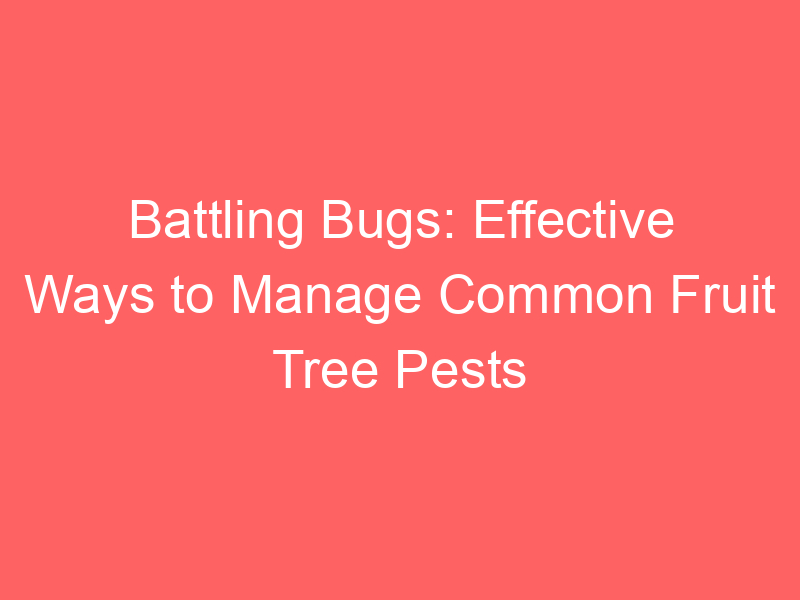Introduction to Organic Pest Control for Fruit Trees
Organic pest control is a crucial aspect of fruit tree care that every plant lover should understand. It involves the use of natural methods to prevent and manage pests, ensuring that your fruit trees remain healthy and productive. This introduction will help you understand the importance of organic fruit tree care and the role of natural pest prevention for fruit trees.
- Understanding the importance of organic fruit tree care
- The role of natural pest prevention for fruit trees
Organic fruit tree care is vital for several reasons. First, it ensures that your fruit trees are free from harmful chemicals often found in synthetic pesticides. These chemicals can contaminate the fruits and the soil, posing health risks to you and your family. Second, organic fruit tree care promotes biodiversity by encouraging the presence of beneficial insects and organisms that naturally control pests. Lastly, it contributes to environmental sustainability by reducing pollution and soil degradation caused by chemical pesticides.
Natural pest prevention plays a significant role in organic fruit tree care. It involves practices such as companion planting, where certain plants are grown together because they help repel pests. Another method is the use of natural insect repellents, which deter pests without harming the trees or the environment. Natural pest prevention also includes regular monitoring and early detection of pests, which allows for timely and effective control measures. By preventing pest infestations, you can ensure the health and productivity of your fruit trees.
In conclusion, organic fruit tree care and natural pest prevention are essential for growing healthy and productive fruit trees. They not only safeguard your health and the environment but also enhance the biodiversity and sustainability of your garden. So, embrace organic pest control and enjoy the fruits of your labor!
Why Choose Natural Insect Repellents for Plants?
When it comes to protecting your fruit trees from pests, it’s essential to consider the impact of your choices on the environment and the health of your plants. Natural insect repellents offer numerous benefits, which we will explore below.
- Benefits of eco-friendly pest repellents
- Impact of non-toxic pest control for gardens on the environment
Eco-friendly pest repellents are designed to be safe for both the environment and your plants. They don’t contain harsh chemicals that can harm your fruit trees or the insects that are beneficial to your garden. Instead, they use natural ingredients that deter pests while promoting the health of your plants.
For instance, neem oil, a common ingredient in natural insect repellents, is derived from the seeds of the neem tree. It’s effective against a wide range of pests, including aphids, mites, scale, and whiteflies, without harming beneficial insects like bees and butterflies. It also has antifungal properties that can help prevent diseases in your fruit trees.
Non-toxic pest control methods have a positive impact on the environment. They don’t contribute to pollution or harm wildlife, unlike synthetic pesticides that can contaminate soil, water, and air. They also help maintain biodiversity by not killing beneficial insects and other non-target species.
Moreover, non-toxic pest control methods are sustainable. Many natural insect repellents can be made at home using ingredients you already have, reducing waste and the need for plastic packaging. They also promote the health of your soil, which can improve the quality and yield of your fruit harvests in the long run.
In conclusion, choosing natural insect repellents for your plants is not only good for your fruit trees but also for the environment. It’s a small step that can make a big difference in promoting sustainability and biodiversity in your garden.
DIY Natural Pest Repellents: A Comprehensive Guide
In this section, we will delve into the world of homemade pest control for fruit trees. We will explore why it’s effective and the key ingredients you need to create your own natural remedies.
Understanding the Basics
- Why homemade pest control for fruit trees is effective
- Key ingredients in natural remedies for fruit tree pests
- Garlic: Known for its strong smell, garlic can be an effective deterrent for many pests.
- Pepper: The spiciness of pepper can deter pests from your fruit trees.
- Neem oil: This natural oil has insecticidal properties and can be used to keep pests at bay.
- Eucalyptus oil: Its strong scent can repel a variety of pests.
Homemade pest control solutions for fruit trees are not only cost-effective but also environmentally friendly. They are free from harmful chemicals that can damage the soil and the quality of your fruits. They work by repelling pests, rather than killing them, which helps maintain the natural balance in your garden. According to a Wikipedia article on pest control, natural repellents can be just as effective as synthetic ones when used correctly.
There are several key ingredients that you can use to make natural pest repellents for your fruit trees. These include:
These ingredients can be mixed with water and sprayed on your fruit trees to keep pests away. Remember, the goal is not to kill the pests, but to make your trees less appealing to them.
Now that we have understood the basics, let’s move on to some DIY recipes for natural pest repellents.
Step-by-Step DIY Natural Pest Repellent Recipes
Now that we’ve covered the basics, let’s dive into some easy-to-follow, homemade pest repellent recipes. These natural remedies will help you protect your fruit trees from harmful pests without harming the environment.
- Recipe 1: Garlic and Cayenne Pepper Spray
- Recipe 2: Neem Oil Spray
- Recipe 3: Eucalyptus Oil Spray
This potent mixture is a great deterrent for a variety of pests. Garlic’s strong smell repels many insects, while cayenne pepper adds an extra kick that pests dislike.
Ingredients: 2 cloves of garlic, 1 tablespoon of cayenne pepper, and 1 liter of water.
Instructions: Blend the garlic and cayenne pepper with a small amount of water. Add this mixture to the rest of the water and stir well. Spray this solution on the leaves of your fruit trees, making sure to cover both the top and bottom of the leaves.
Neem oil is a natural pesticide that’s safe for beneficial insects like bees and butterflies. It disrupts the life cycle of harmful insects, preventing them from maturing and reproducing.
Ingredients: 2 tablespoons of neem oil, 1 liter of water, and a few drops of dish soap.
Instructions: Mix the neem oil and water together. Add the dish soap, which helps the solution stick to the leaves. Spray this mixture on all parts of the fruit tree, paying special attention to the undersides of leaves where pests often hide.
Eucalyptus oil is a natural insecticide that’s particularly effective against mites and aphids. Its strong scent also helps deter pests.
Ingredients: 10 drops of eucalyptus oil and 1 liter of water.
Instructions: Mix the eucalyptus oil with the water. Spray this solution on the fruit tree, ensuring all leaves and branches are covered. Repeat this process every few days for the best results.
Remember, consistency is key when using these natural pest repellents. Regular application will ensure your fruit trees stay healthy and pest-free. Happy gardening!
Case Studies: Success Stories of Organic Pest Control
Let’s delve into the real-life success stories of organic pest control. These case studies will provide you with a clear understanding of how natural pest repellents can effectively protect your fruit trees from harmful insects, without causing any damage to the environment.
- Case Study 1: Apple Orchard in Washington
- Case Study 2: Citrus Grove in Florida
In the heart of Washington, a local apple orchard owner decided to switch to organic pest control methods. After years of using chemical pesticides, the owner noticed a decline in the quality of the apples and the health of the trees. The decision was made to use a combination of beneficial insects, such as ladybugs and lacewings, and natural sprays made from garlic and hot pepper.
After one growing season, the orchard experienced a significant decrease in pest damage. The apples were healthier, and the trees were more vibrant. The owner also reported an increase in the number of pollinators visiting the orchard, which led to a higher yield. This case study proves that organic pest control methods can be just as effective, if not more so, than their chemical counterparts.
Down in sunny Florida, a citrus grove owner was struggling with a severe infestation of citrus psyllids, a pest that can cause devastating damage to citrus trees. Instead of resorting to chemical pesticides, the owner decided to try a natural approach. They introduced beneficial insects, such as lady beetles and parasitic wasps, to the grove and used a citrus oil spray as a natural repellent.
The results were astounding. Within a few months, the psyllid population was under control, and the trees were healthier than ever. The grove owner also noticed an increase in the number of birds and butterflies visiting the grove, adding to the overall health and biodiversity of the ecosystem. This case study demonstrates the power of natural pest repellents in maintaining the health and productivity of fruit trees.
These case studies highlight the effectiveness of organic pest control methods. Not only do they protect your fruit trees from harmful pests, but they also contribute to a healthier and more balanced ecosystem. So, why not give it a try? Your fruit trees, and the environment, will thank you.
Key Takeaways: Effective Organic Fruit Tree Care
As we delve into the world of organic fruit tree care, it’s important to remember a few key points. These takeaways will not only help you maintain a healthy and productive fruit tree but also ensure that your gardening practices are environmentally friendly.
- Importance of Regular Monitoring for Pests
- Benefits of Using Natural Pest Repellents
- Impact of Organic Pest Control on Fruit Tree Health
Regular monitoring of your fruit trees is crucial in identifying any potential pest infestations early on. This allows you to take immediate action before the pests can cause significant damage. According to a study on Integrated Pest Management, early detection and intervention can reduce pest populations by up to 90%.
Using natural pest repellents is not only safer for the environment but also for the health of your fruit trees. Chemical pesticides can often harm beneficial insects and microorganisms that contribute to the overall health of your trees. Natural repellents, on the other hand, target only the harmful pests without disrupting the ecological balance.
Organic pest control methods can significantly improve the health and productivity of your fruit trees. By avoiding harsh chemicals, you allow your trees to absorb nutrients more efficiently, leading to better growth and higher fruit yields. A report on organic farming found that organically managed orchards produced fruit with higher nutritional content compared to conventionally managed ones.
In conclusion, effective organic fruit tree care involves regular monitoring for pests, using natural pest repellents, and understanding the positive impact of organic pest control on your fruit trees’ health. By adopting these practices, you can enjoy a bountiful harvest from your home orchard while also contributing to a healthier environment.
Conclusion: Embracing Environmentally Friendly Pest Control for Fruit Trees
As we draw our discussion to a close, it’s clear that the benefits of natural pest control methods are numerous and significant. Not only do these methods help maintain the health and productivity of your fruit trees, but they also contribute to the overall well-being of our environment.
- Recap of the benefits of natural pest control methods: Organic pest control methods are safe for both the plants and the environment. They help maintain the natural balance of the ecosystem, prevent the development of pest resistance, and reduce the risk of harmful chemical residues. Moreover, they are cost-effective and often utilize resources that are readily available in your home or garden.
- Encouragement to continue learning and experimenting with organic pest control: The world of organic pest control is vast and ever-evolving. There are always new methods and techniques to discover and try. So, keep exploring, keep learning, and keep experimenting. Remember, every small step you take towards organic gardening contributes to a healthier and more sustainable world.
Embracing environmentally friendly pest control methods for your fruit trees is not just about getting a bountiful harvest. It’s about taking responsibility for the health of our planet and future generations. It’s about making a conscious choice to nurture nature rather than exploit it. So, let’s continue to grow, learn, and make a difference, one fruit tree at a time.

